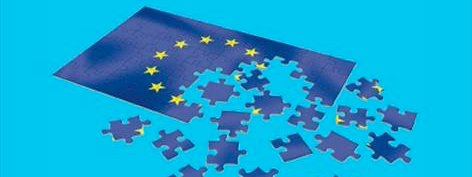
Europe and the Gospel
Starting from today, the Schuman Centre will publish some extracts of the future new edition of the book ‘Europe and the Gospel’ by Evert Van de Poll, which will be published soon. We start today with the introduction of the book.
Having pursued my walk of life in different European countries and having been engaged in teaching activities outside the continent, I have become increasingly aware of the specific sociocultural character of Europe, as compared to other regions of the world.
Across the continent and the isles around it, one meets a diversity of ethnic backgrounds, languages, cultures, religions and national histories, yet all of those are part of a whole, a sort of overarching reality or unifying field called ‘Europe’. What exactly does that mean? What makes a population, a country or a culture ‘European’? These are the questions that aroused my interest in the historical and cultural phenomenon of Europe.
Living and working in different parts of Europe has also made me aware of the challenges of communicating the message in societies that have been shaped by a long history of Christianisation, but that have now become largely secularised and multireligious. This led me to study ‘Europe’ from a socioreligious angle, in order to gain a better understanding of this particular context in which the Church is called to fulfil its mission. Usually, Churches and mission organisations concentrate on the characteristics of one country, but when we take a broader look, we discover the same socioreligious realities and trends all over Europe, and this sheds light on any ‘national’ situation.
This dual interest has led me to write a series of essays that are brought together in this book.
I am particularly interested in the influence of Christianity on the making of Europe in the past, its role in current developments such as the process of economic and political integration that has resulted in the European Union, and its place in today’s society. What is the heritage of European Christianity and how do we value it? In what ways are today’s European societies ‘post Christian’? To what extent and in what ways are the Europeans still ‘Christian’? What are the secularising and religious trends, what will the future hold in this respect? Are we perhaps moving towards ‘post-secular’ situations, as some observers say, and what does that imply? Finally, what are typical barriers and bridges for the communication of the message that once shaped the European world in which we live and have our being?
Set the record straight
These questions are important, because in our days there is a strong tendency to downplay the role of Christianity in the making of European values such as democracy, equality, freedom of conscience, human dignity, social justice, and so on. We are constantly hearing another story, telling us that these are the fruits of secular Enlightenment philosophy in the eighteenth century. We are being told that we owe democracy and rational science to the ancient Greeks, and to their enlightened disciples in modern Europe. Humanism is presented as a secular alternative to the intolerance, the persecutions, and the religious wars that Christianity has brought in the past. According to this story, Christianity belongs to the past. We can appreciate its cultural and religious heritage, but it is not a guide for the making of Europe tomorrow.
This story, for all its popularity, especially in the Western part of Europe, is a myth, a secular myth. While it contains many elements of truth, it overlooks or reinterprets other elements. In so doing, it constructs a storyline that simply does not stand up to the facts. In this book I intend to set the record straight. When we look to the making of Europe in the past without prejudice, we see the far reaching impact of the Bible and the Christian faith, which have transformed the culture, the worldview and the identity of its inhabitants, and shaped every sphere of society. I cannot honestly escape the conclusion that without this influence, Europe as we know it today would never have existed. Even the European UnionSo, we need to correct the story of Christianity and Europe and tell it as truthfully as possible. In doing so, I am persuaded that this story is far from being ended.
There are more chapters to come!
Evert van de Poll
Professor of Religious Science and Missiology at Evangelical Theological Faculty, Leuven and a pastor with the French Baptist Federation.

This Post Has 0 Comments